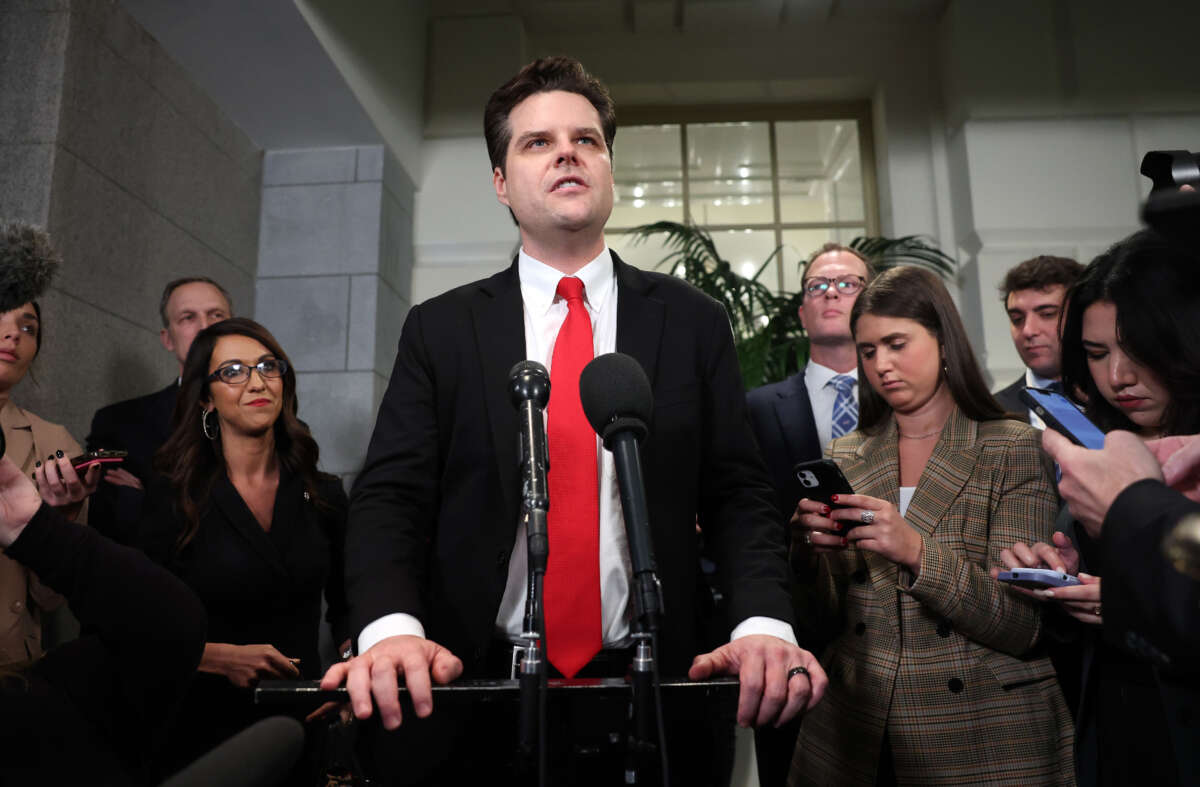As Republicans negotiate a potential deal to defeat the week-long impasse in selecting a speaker of the House of Representatives, one of the GOP holdouts, Rep. Matt Gaetz (Florida), has indicated that support from him and his allies won’t come easy.
GOP House leader Rep. Kevin McCarthy (California) has made 11 unsuccessful attempts so far to win a majority of votes in the race for the speakership. Because the Republican Party has 222 members in the House, McCarthy can only afford to lose four GOP votes to attain the 218-vote majority needed. However, around 20 Republicans have opposed him each time, and he has barely made it over 200 votes in any of the votes held so far.
News of a potential deal to defeat the impasse spread on Thursday evening, as negotiations between McCarthy and the GOP holdouts began to make headway. Though the framework of the deal has not been finalized, it appears that it could redirect some of the anti-McCarthy votes but not all of them.
Those backing McCarthy believe that getting even a few of the holdouts to vote for him will create momentum for the House GOP leader. But McCarthy needs to get all but four holdouts to agree to his terms in order to win the speakership, which will be challenging given that some of his opponents are asking for more than he wants to give.
Gaetz is perhaps the most steadfast holdout among the Republicans opposed to McCarthy so far, making it clear to reporters on Thursday afternoon that he would only support McCarthy if he agreed to have a weak and constrained speakership.
“This ends one of two ways,” Gaetz said. “Either Kevin McCarthy withdraws from the race or we construct a straight jacket that he is unable to evade.”
Gaetz, who voted three times on Thursday for former President Donald Trump to be speaker, indicated that he and many of the 20 Republicans opposed to McCarthy are willing to hold out as long as it takes —“as far as the cherry blossoms fall,” he said, referring to a phenomenon in Washington, D.C. that usually occurs in April.
Meanwhile, the patience of Republicans who have been supporting McCarthy is beginning to wear thin. Rep. Ken Buck (Colorado), for example, indicated prior to the ballots held on Thursday that if McCarthy couldn’t win the speakership that day, he would consider nominating someone else who could.
McCarthy faces another issue in regard to negotiating a deal: If he grants too many concessions to the holdouts, some of the most extremist members of the GOP, he risks alienating moderates within the party.
“GOP Leader Kevin McCarthy seems willing to give away just about anything to become House speaker. But at a certain point, concessions to far-right members could start to bleed support from his existing allies,” said a report from the conservative publication The Dispatch.
If the impasse continues for several more days, there is a slim but real possibility that a “coalition” candidate — a person that a significant number of Republicans and Democrats could agree on — will be nominated and secure the 218 votes needed to become speaker. Such an agreement between the two parties’ moderates would require concessions from Republicans — potentially including a power-sharing agreement in the next session of the House — in order to be successful.
If the deal between McCarthy and the far right holdouts falls apart, or if it’s only able to sway a few of the anti-McCarthy Republicans, the likelihood of a bipartisan, coalition candidate will increase tremendously, especially if a speaker cannot be chosen by next week.
Trump is silencing political dissent. We appeal for your support.
Progressive nonprofits are the latest target caught in Trump’s crosshairs. With the aim of eliminating political opposition, Trump and his sycophants are working to curb government funding, constrain private foundations, and even cut tax-exempt status from organizations he dislikes.
We’re concerned, because Truthout is not immune to such bad-faith attacks.
We can only resist Trump’s attacks by cultivating a strong base of support. The right-wing mediasphere is funded comfortably by billionaire owners and venture capitalist philanthropists. At Truthout, we have you.
Truthout has launched a fundraiser, and we have only 24 hours left to raise $15,000. Please take a meaningful action in the fight against authoritarianism: make a one-time or monthly donation to Truthout. If you have the means, please dig deep.
